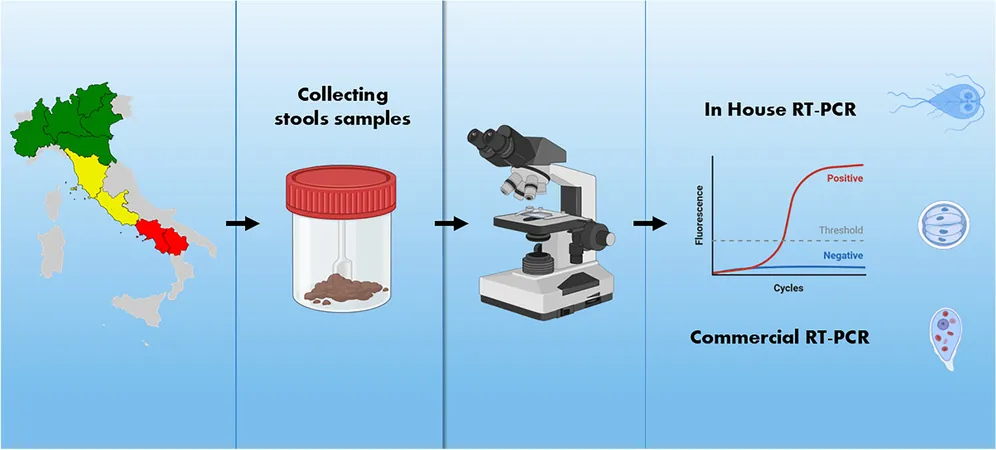
Revolutionizing Protozoa Detection: A Game-Changer in Diarrheal Disease Diagnosis
2025-08-01
Author: Daniel
A Global Health Crisis Unveiled
Pathogenic intestinal protozoa are silently wreaking havoc worldwide, causing diarrhea in an alarming 3.5 billion people each year. Diagnosing these infections has proven to be a thorny challenge, as traditional microscopy—despite being the gold standard—lacks the sensitivity and specificity needed to accurately identify these harmful organisms. Now, cutting-edge molecular diagnostic technologies, especially real-time PCR (RT-PCR), are emerging as powerful players in the fight against these infections.
The Comparative Study: Methodology and Performance
In an impressive multicenter study encompassing 18 Italian laboratories, researchers set out to compare the efficacy of a commercial RT-PCR test (from AusDiagnostics) against an in-house PCR assay and the traditional microscopy method. They focused on notorious intestinal culprits: Giardia duodenalis, Cryptosporidium spp., Entamoeba histolytica, and Dientamoeba fragilis.
Key Findings: A Leap Forward in Identification
From 355 stool samples analyzed, both RT-PCR methods exhibited high sensitivity and specificity—especially for detecting G. duodenalis. Microscopy, while effective, fell short in differentiating between closely related species, a gap these molecular approaches filled effortlessly. Interestingly, preserved stool samples outperformed fresh ones, likely due to improved DNA integrity.
Challenges in Detection: Cryptosporidium and Dientamoeba Debates
While both RT-PCR tests performed admirably, sensitivity issues surfaced for Cryptosporidium spp. and D. fragilis, raising questions about DNA extraction processes. The study hinted that these complexities may prevent a complete transition from microscopy to molecular methods for these pathogens. Nonetheless, molecular assays still promise to enhance diagnosis accuracy.
The Future of Diagnostic Parasitology: A Necessary Transition
The results signal a pivotal shift in diagnostic paradigms, highlighting the necessity for standardization of molecular techniques in routine clinical settings. The study advocates for these innovative methods, suggesting they should complement, rather than replace, traditional microscopy to create a comprehensive diagnostic toolkit.
Implications for Global Health and Research
Given their significant impact on global health and the growing need for robust diagnostics, further research into optimizing sample collection, storage, and DNA extraction methods is imperative. This ongoing battle against intestinal protozoa requires innovative approaches, making molecular diagnostics a potential game-changer in improving patient outcomes and public health.


 Brasil (PT)
Brasil (PT)
 Canada (EN)
Canada (EN)
 Chile (ES)
Chile (ES)
 Česko (CS)
Česko (CS)
 대한민국 (KO)
대한민국 (KO)
 España (ES)
España (ES)
 France (FR)
France (FR)
 Hong Kong (EN)
Hong Kong (EN)
 Italia (IT)
Italia (IT)
 日本 (JA)
日本 (JA)
 Magyarország (HU)
Magyarország (HU)
 Norge (NO)
Norge (NO)
 Polska (PL)
Polska (PL)
 Schweiz (DE)
Schweiz (DE)
 Singapore (EN)
Singapore (EN)
 Sverige (SV)
Sverige (SV)
 Suomi (FI)
Suomi (FI)
 Türkiye (TR)
Türkiye (TR)
 الإمارات العربية المتحدة (AR)
الإمارات العربية المتحدة (AR)